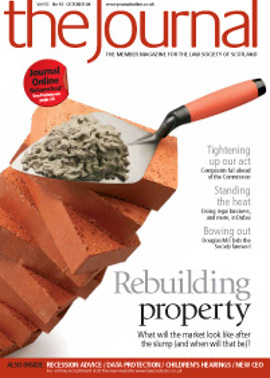SGM: support for review process

The Opinion piece printed in September 2008 Journal by Sara Matheson, the President of the Glasgow Bar Association, in relation to summary criminal legal aid reform came to the conclusion that the profession must work together (on this and other matters) for the common good. The Society of course agrees with this conclusion. How we achieve the “common good” is an issue on which reasonable people can both agree and disagree reasonably. However, I have some comments to make:
The entire thrust of the article is that the Glasgow Bar Association called the meeting because they felt neither they nor the extended membership of the profession were consulted regarding the summary justice reform legal aid proposals or the review process.
Summary criminal legal aid reform was the topic of an extended session at the last Legal Aid Conference. The Society also set up a consultation group which included five members from Glasgow and representatives from other faculties including Hamilton, Aberdeen, Edinburgh, Stirling, Falkirk, West Lothian, Ayr, Dumfries, Dunfermline and the Borders. Correspondence was sent from this group to the profession and in addition there were at least two meetings with the Cabinet Secretary himself, which were attended by representatives from Hamilton, Glasgow, Edinburgh, Stirling, Falkirk, West Lothian and Aberdeen.
Of the 133 proxy votes in favour of the office bearers of the Glasgow Bar Association for the SGM, only 22 came from outwith the Glasgow area. There were 329 proxies in favour of the office bearers of the Society or members of the review group to support their position.
In addition there were a further 46 proxies in the names of individuals from other faculties who either spoke at the meeting in favour of the review group position or had indicated their intention to use the proxies in that way prior to the meeting. These proxies came from throughout the country. Accordingly, on any evidence- based criterion it seems clear that the position taken by the review group was supported by the profession at large.
Since the review process commenced, the minutes of all meetings have been circulated to the profession along with supporting documentation. With particular reference to the Glasgow Bar Association, the review group, accompanied by the President and Vice-President of the Society, attended a meeting of their executive committee on 16 June to seek to persuade them of the advantages of a unified, inclusive approach.
In the article, the President of the Glasgow Bar Association indicates that the Society’s motion, which was supported without dissent, was one that supported only the individual members rather than the review process itself.
That was not the mood of the meeting or the message from those who provided us with their proxies.
It was made clear to the meeting that what we were seeking was support for an inclusive approach in respect of the review process, with a staging post in December, a consultation period in January 2009 and a further meeting of faculty representatives at the end of January or the beginning of February. Every person who spoke at the meeting extolled the virtue and importance of unity.
We have now received from the Scottish Government the group’s remit and also confirmation of Mr MacAskill’s assurances in relation to the review process. This has been distributed to the profession.
With those assurances now in place I hope that the Glasgow criminal bar will now participate fully in the review process.
Oliver Adair, Convenor, Legal Aid Solicitors Committeee
Supporting the cl@n system
I read with interest the web review on cl@n childlaw’s website where it was commented that “the site itself is not nearly as inspiring as the project”. cl@n childlaw is the new outreach law centre in Edinburgh and the Lothians, providing face-to-face legal advice to children and young people in a child-centred manner.
We have two legally qualified employees and have no IT or administration department. Like many other charities, we operate on an extremely limited budget. We were pleased to have been able to create our own website for a minimal outlay, so allowing us to direct most of our resources towards delivery of our unique service. However, we are the first to recognise the weaknesses of our website. Bearing in mind that many firms do have corporate social responsibility agendas, is there anyone out there able to assist?
I should however report that as cl@n childlaw has already provided legal advice to 50 children and young people, its website has not proved to be a substantial barrier so far to people accessing the service.
With many thanks in anticipation.
Alison Reid, Solicitor, cl@n childlaww
In this issue
- IHT: spouses and the nil rate band
- Taking up the message
- SGM: support for review process
- Rebuilding to order?
- Nipped in the bud?
- Hearing better
- Dubai: an ever-expanding market
- When is a discharge not a discharge?
- Out of the hot seat
- Site to behold
- Now for the real thing
- Navigating the perfect storm
- Data, personal data and statistics
- Caring about sharing
- Rainmaker - or cloud on the horizon?
- The limits of belief
- Process queries
- Scottish Solicitors' Discipline Tribunal (1)
- Scottish Solicitors' Discipline Tribunal (2)
- From agreement to obligation
- Ganging up on exploitation
- Scottish Solicitors' Discipline Tribunal
- Website review
- Book reviews
- Up for the big event
- Old lessons hold good
- The revolution starts here?
- CML Handbook: why the fuss?






